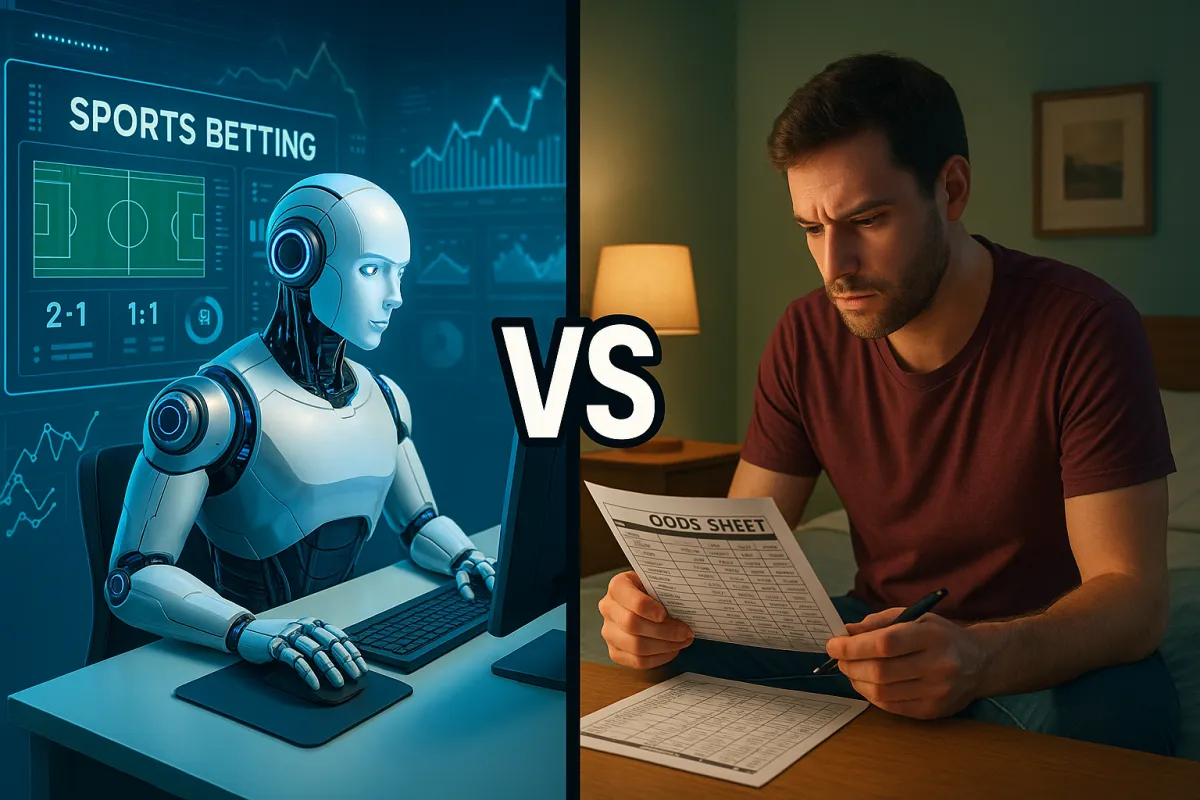AI Sports Betting: How Artificial Intelligence Is Revolutionizing the Future of Wagering

The global sports betting market is advancing fast. With bettors and bookies both looking for smarter and more reliable insights. From automated odds calculation to live, in-play evaluation, artificial intelligence is changing the game towards precision and profitability.
In this guide, we’ll explore:
- How AI works in sports betting
- Real-world effects
- Moral and regulatory problems
- Trends deciding the future of digital betting
What Is AI Sports Betting?
AI sports betting mixes artificial intelligence into the betting process. Instead of relying on human analysis, bettors and bookies use machine learning and predictive analytics to interpret complex data.
Technologies associated with AI
- Machine Learning (ML): Allows systems to identify patterns and learn from past data to improve predictions over time.
- Neural Networks: Copy human brain behaviors to process data and learn from it.
- Predictive Analytics: Makes use of data and statistics to predict possible match results.
- Data Mining: Extracts patterns that are barely obvious from large data, things like player tracking, for example.
The difference between AI-assisted betting tools and traditional betting strategies
| AI Betting | Traditional Betting |
|---|---|
| It continuously updates stats based on live data | It depends heavily on past performance |
| Decisions are made with data and without emotion | Decisions are made by human emotions |
| It continuously improves its predictions | Strategies follow a specific pattern |
The Smart Tool Behind Today’s Sports Betting
Data Collection and Processing
AI-powered systems rely heavily on large datasets to function effectively. They gather data such as:
- Player and team statistics
- Historical match results
- Weather conditions and travel schedules
- Injury and suspension reports
- Odds and betting market changes
Predictive Modeling
Once data is collected, predictive models are trained to recognise outcome patterns.
- Supervised learning uses labelled data, like known match results, to predict similar future outcomes.
- Unsupervised learning identifies hidden relationships, such as a team’s performance dip under certain conditions.
Real-Time Market Adjustment
Bookies now use AI to change odds as matches unfold, which means that AI predicts several instances over time before picking the best odds. When there’s a major change in a game, AI immediately modifies odds, making sure to show the new potential outcomes. Bettors can benefit from this.
Real-World Effects
Bookmakers Using AI
Major bookies have started making use of AI:
- Bet365: Uses real-time predictive algorithms for in-play betting.
- Pinnacle: Employs automated systems to adjust odds instantly based on live data.
- DraftKings: Makes use of AI for personalised bet recommendations aligned with user behaviour.
Customer Betting Tools
For bettors, AI-powered platforms assist with research and making selections:
- OddsJam – Locates the best odds amongst bookies.
- SmartBet – Processes thousands of match outcomes for accurate predictions.
- BetBuddy – Supports responsible gambling by giving breakdowns.
- Sportspicker AI – Delivers top AI selections and transparent performance tracking.
AI in Sports Analytics and Team Strategies
AI tools used by professional teams are similar to betting models. Stats such as expected goals (xG) and win probability also aid betting algorithms. They enhance both team performance and betting accuracy.

How AI Sports Betting Helps
- Better Prediction: AI models are most times better than human analysis by applying different factors. They identify patterns that humans might ignore, leading to better success rates.
- Fact-Based Selections: Does not factor in emotions, thereby reducing the risk of errors and creating better discipline while betting.
- Live Betting: As the game goes on, updates are made immediately, which gives bettors an edge over those who do it manually.
- Better Odds Contrast: Algorithms detect opportunities before odds shift. This gives bettors an edge in taking the best opportunity available.
- Personalised Experiences: AI recommends bets based on user patterns, which helps align user experience and creates satisfaction.
- Detects Scams: AI helps to flag unusual activity like match fixing, thereby preventing fraud and helping to protect users.
Example: AI prediction models increased earnings for bettors by 16-18% during the 2024 UEFA Champions League season.
Problems and Barriers of AI
Data Quality & Bias
AI predictions can only be good if the data is accurate; if there are errors, the results will reflect them as well, which causes problems.
Overfitting & Model Drift
AI predictions can be outdated when a team changes its style of play, for example. Retraining from time to time is important to avoid wrong predictions.
Ethical and Regulatory Concerns
AI leads to privacy and trust issues:
- Player and user data collection can raise consent questions.
- There’s a risk of game manipulation with AI prediction tools.
Regulators like the UK Gambling Commission (UKGC) and Malta Gaming Authority (MGA) are developing frameworks to ensure AI transparency and compliance.
AI Models vs. Human Feeling

- Professional bettors rely on their gut and experience, while AI models take into account factors humans may overlook.
- Studies show that AI has a better win accuracy than human expert predictions.
- AI analyses data faster, while humans have to research extensively.
- AI does not use emotions, while an experienced bettor can have a bias or be influenced by emotion.
However, combining AI analytics with human context has been proven to bring about the best results.
The Rise of AI in E-Sports and Virtual Sports Betting
AI thrives in e-sports due to its digital nature. Every movement in titles like FIFA generates measurable data, ideal for predictive modelling. Algorithms assess player reflex speeds, team strategies, and momentum shifts in real time. AI-generated virtual sports simulation matches using ML algorithms are also gaining popularity. These simulations ensure fairness and constant availability, appealing to bettors worldwide.
Best Sports Betting Platforms and Tools for 2025
| Platform | Focus | Features | Notable Strength |
|---|---|---|---|
| SmartBet AI | Multi-sport predictions | Machine learning + real data feed | 80% match coverage accuracy |
| OddsJam | Odds comparison | Detects value bets | Ultra-fast updates |
| ZCode System | Predictive analytics | Long-term trend tracking + user community | Transparency and verified results |
| Sportspicker AI | AI picks | NFL/NBA specialization | Public success tracking |
| BettorEdge AI | Betting exchange insights | Market sentiment + peer-to-peer data | Real-time community insights |
Note: Make sure to verify a platform’s transparency and compliance with gambling regulations before use.
How AI Encourages Betting Responsibly
AI helps to protect users; it's not just about providing good odds. Bookies make use of machine learning tools to identify gambling problems like excessive user betting. These models encourage safer betting environments by placing limits on bets. They ensure accountability rather than exploiting users.
Future Trends in AI Sports Betting
- Accurate Predictions: Adding precise player data and biometrics for accurate analysis
- Generative AI: Match simulations and predictive commentary.
- Blockchain & AI Collaboration: Decentralised, honest betting models.
- Increased Reality Betting: Live data that increases fan engagement.
- Autonomous Betting Bots: Regulated self-learning agents executing micro-bets across markets.
“By 2030, over 60% of sports wagers will be influenced by AI-based decision systems.” – Industry Analyst Forecast
Conclusion
The move from traditional betting to AI-driven betting marks a defining shift in the gambling world. AI doesn’t just make betting faster; it makes it smarter. By combining predictive analytics with responsible input, the industry is moving toward a more advanced and transparent future. AI sports betting is not about increased gambling; it’s about betting smartly. The true power of this technology lies in balance, where human ideas meet machine precision.
“Artificial intelligence isn’t replacing human ideas in sports betting, it’s redefining what smart betting means in the digital era.”